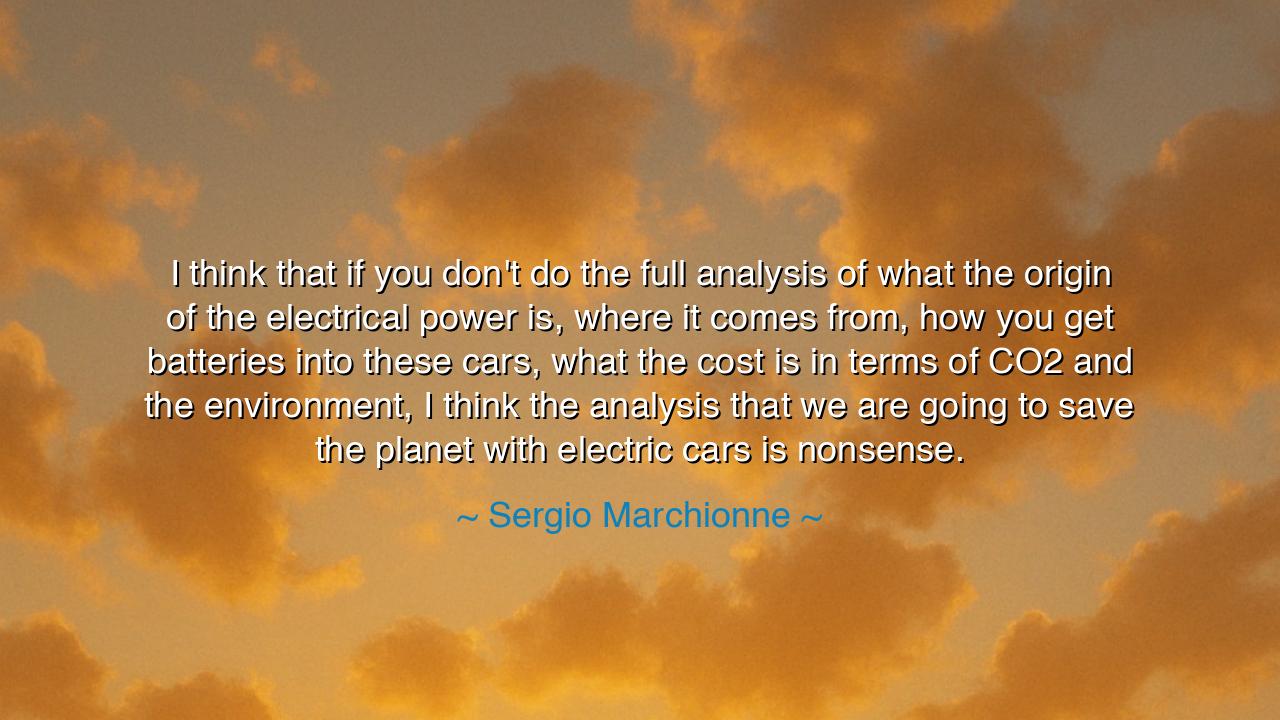
I think that if you don't do the full analysis of what the
I think that if you don't do the full analysis of what the origin of the electrical power is, where it comes from, how you get batteries into these cars, what the cost is in terms of CO2 and the environment, I think the analysis that we are going to save the planet with electric cars is nonsense.






In these cautious and probing words, Sergio Marchionne calls for rigorous analysis and discernment when confronting grand solutions to complex problems. He warns that the promise of saving the planet with electric cars cannot be accepted at face value. One must examine the origin of the electrical power, the environmental costs of battery production, and the hidden impact on CO2 emissions and the environment. Marchionne reminds us that well-intentioned solutions may carry unforeseen consequences if pursued without careful study, and that true wisdom lies in understanding the whole system rather than embracing appearances.
The origin of this insight lies in Marchionne’s experience as a leader in the automotive industry, where technological advances often meet both promise and limitation. He observed that electrification, while heralded as a solution to climate change, depends on power generation, resource extraction, and industrial processes that carry their own environmental burdens. By calling for a full analysis, he channels the timeless tradition of critical inquiry: before acting, one must understand not only the immediate effects, but the chain of consequences that radiate through nature and society.
History provides compelling parallels. In the early Industrial Revolution, the shift to coal-powered machinery promised unprecedented productivity and prosperity, yet few considered the pollution and social costs it imposed. Cities choked on smoke, rivers ran black with waste, and laborers suffered. It was only through subsequent analysis and reform that the consequences were recognized and addressed. Marchionne’s admonition echoes this lesson: innovation must be tempered with responsibility and a careful accounting of hidden costs.
His words also illuminate the moral dimension of technology. Solutions that appear virtuous or forward-thinking may, if unexamined, produce harm as profound as the problems they aim to solve. By questioning assumptions about electric cars and energy, Marchionne emphasizes that ethical responsibility requires awareness, foresight, and rigorous evaluation. True stewardship of the planet demands more than enthusiasm; it demands clarity, honesty, and the courage to confront inconvenient truths.
Ultimately, this quote is a meditation on prudence, inquiry, and environmental responsibility. Marchionne teaches future generations that the path to progress is not paved with optimism alone but with careful study and understanding of all consequences. Let this wisdom endure: to act without insight is to risk harm even in the service of good, and only through comprehensive analysis of origin, impact, and cost can we hope to create solutions that are genuinely sustainable and just for the world.






TTHoang Thi Thanh Thuy
It’s interesting to think that the push for electric vehicles might be a partial fix rather than a full solution. If we’re still burning fossil fuels to generate the electricity that powers EVs, aren’t we just displacing emissions? I wonder whether the key lies in transforming the energy grid itself — moving to solar, wind, and nuclear — before we can claim that electric cars genuinely contribute to saving the environment.
MFM4- FF
I find this viewpoint refreshingly honest. It’s uncomfortable to admit, but maybe we’ve oversimplified the narrative about saving the planet through electric cars. The quote raises a critical issue about systems thinking: we can’t isolate one element of technology and call it a solution without considering the entire supply chain. Shouldn’t sustainability be measured not just at the point of use, but across extraction, production, and waste as well?
TNThao Nguyen
This quote makes me question whether the push for electric cars is more about marketing than genuine sustainability. Are companies and governments promoting EVs simply because it looks good politically, while ignoring the hidden carbon costs of battery production and energy sourcing? I’m curious if anyone has calculated the environmental 'break-even point' — the moment when an electric car truly becomes greener than a gas car over its lifetime.
HNhan nguyen
I completely understand where this concern comes from. It’s easy to assume that electric cars equal environmental salvation, but the reality might be far more nuanced. How much energy and raw material extraction does it take to make those massive lithium batteries? And how are those materials mined — ethically or destructively? Maybe instead of focusing only on electric vehicles, we should be investing more in renewable energy infrastructure first.
2L20. Linh
This statement really challenges the mainstream narrative around electric cars being inherently 'green.' It makes me wonder — are we just shifting pollution from the tailpipe to the power plant? If the electricity used to charge these vehicles still comes from coal or gas, then what’s the real net gain for the planet? I’d love to see a comprehensive study that compares full life-cycle emissions between EVs and traditional cars, including battery disposal.